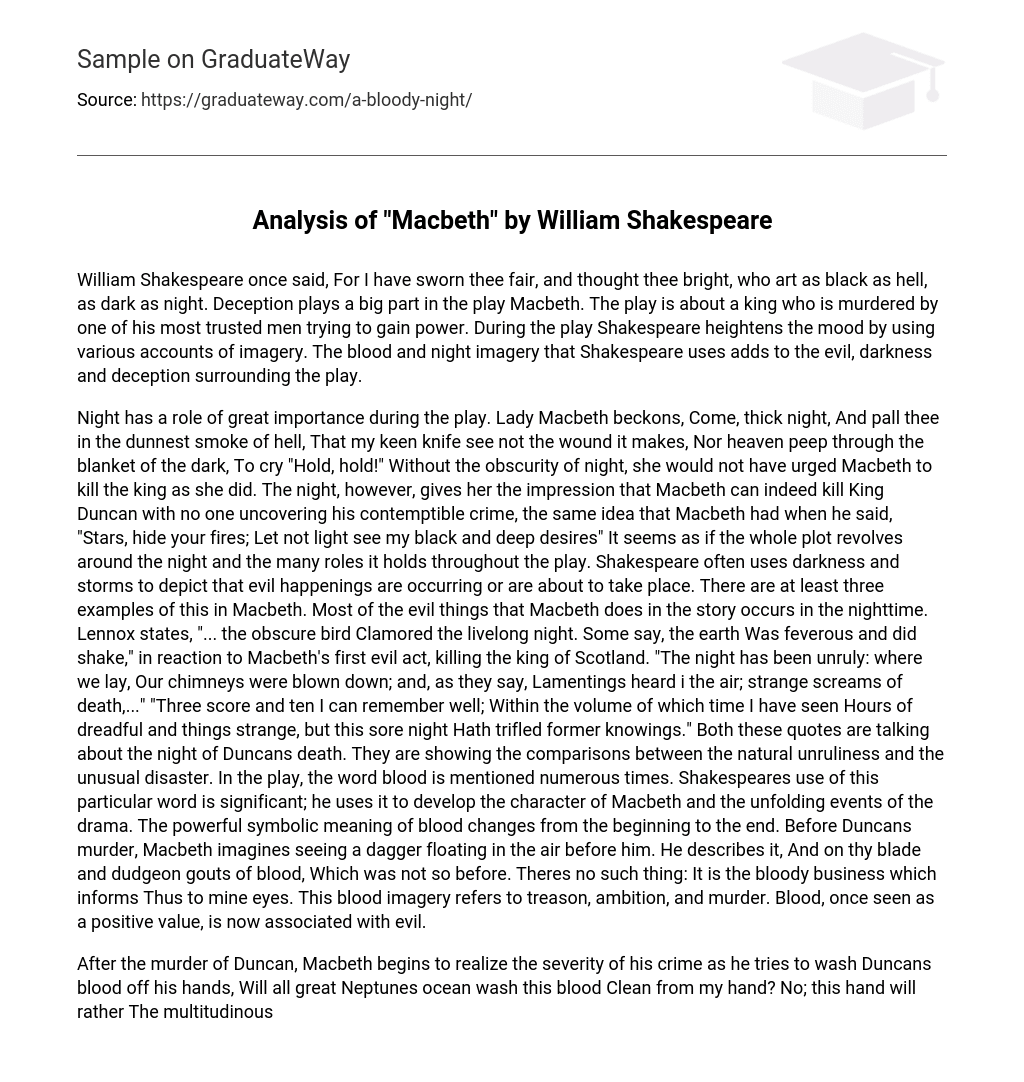In his play Macbeth, William Shakespeare examines the concept of deception through the behaviors and conversations of the characters. The storyline revolves around a faithful servant’s assassination of a monarch in order to acquire authority. Shakespeare adeptly builds a foreboding ambiance with his intricate depictions. By utilizing imagery such as blood and darkness, he heightens the sense of evilness and deceit that permeates the story.
Night plays a significant role in the play. Lady Macbeth calls on it to conceal her husband’s actions, saying, “Come, thick night, And pall thee in the dunnest smoke of hell, That my keen knife see not the wound it makes, Nor heaven peep through the blanket of the dark, To cry ‘Hold, hold!'” Without the cover of darkness, Lady Macbeth would not have encouraged Macbeth to kill the king. She believes that night allows Macbeth to commit the crime without being discovered. This idea is echoed in Macbeth’s own words when he says, “Stars, hide your fires; Let not light see my black and deep desires.” Darkness and storms are often used by Shakespeare to indicate evil happenings or impending doom. In Macbeth, there are multiple examples of this. Most of the evil deeds committed by Macbeth occur at night. Lennox describes the chaos that ensues after the king’s murder, saying, “The obscure bird clamored the livelong night. Some say, the earth was feverous and did shake.” The night is portrayed as unruly and tumultuous, with strange screams of death filling the air. It seems that the entire plot revolves around the night and its various roles in the play.During the time I have witnessed many hours of dreadful and strange things, but this troubling night has surpassed my previous experiences. Both of these quotes are referring to the night when Duncan was killed. They are highlighting the contrast between the natural disorder and the unusual catastrophe. In this play, the word “blood” is mentioned numerous times. Shakespeare’s deliberate use of this word is significant as it aids in developing the character of Macbeth and revealing the unfolding events of the drama. The symbolic meaning of blood holds immense power, but its significance changes throughout the story. Before Duncan’s murder, Macbeth envisions a dagger floating in the air before him. He describes it as having bloodstains on its blade and handle, which was not present before. Macbeth realizes that it is the horrific act that has stained his sight with this imagery of blood. This recurring blood imagery serves to represent treason, ambition, and murder. Blood, once considered a positive symbol, is now associated with evil.
After Duncan’s murder, Macbeth recognizes the severity of his crime and endeavors to cleanse his hands of the blood. He wonders if even the vast ocean can wash away his guilt: “Will all great Neptune’s ocean wash this blood clean from my hand? No; this hand will rather turn the green seas red.” Macbeth mourns that not even the immense expanse of the ocean can erase his wrongdoing and begins to comprehend the magnitude of his evil act. Witnessing Banquo’s ghost at a feast, whom he had ordered to be killed, shocks Macbeth, requiring Lady Macbeth to guide him back to their chamber. Before going to sleep, he confides in Lady Macbeth, expressing that there is no turning back from his deep involvement in evil: “All causes shall give way: I am so deeply immersed in blood that it would be as tiresome to return as it would be to go further.” Macbeth acknowledges that he has immersed himself deeply in a world of sin and understands that he must continue committing violent acts to maintain power. His sins have not only corrupted his once virtuous life but also sealed his fate in eternal damnation. Likewise, Lady Macbeth comprehends her role in the murder plot and anticipates severe consequences. Plagued by nightmares, she sleepwalks through her bedroom questioning whether her hands will ever be clean. Despite using perfumes from Arabia, Lady Macbeth comments on the lingering smell of blood.The presence of a foul odor in the air symbolizes Lady Macbeth’s guilt over Duncan’s murder, as well as her descent into madness. This guilt is further emphasized through the use of blood imagery, with Lady Macbeth constantly imagining blood on her hands and attempting to wash it off. The climax of the play occurs when Macduff confronts Macbeth, seeking vengeance for the deaths of his family and to establish Malcolm as the rightful king. Upon seeing Macbeth, Malcolm is rendered speechless and condemns him as an even greater villain than words can express. Shakespeare utilizes this blood imagery to highlight how Macbeth has completely transformed from a noble and righteous individual into an evil, ambitious, and deceitful person since Duncan’s murder. Eventually, Macbeth experiences remorse for his actions and realizes that punishment awaits him for his sins.
Shakespeare skillfully utilizes the words “night” and “blood” in Macbeth to shape the play and infuse it with themes of deceit, ambition, and brutality. The choice of words and their usage can profoundly impact a play’s effectiveness.





